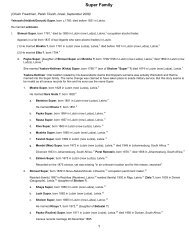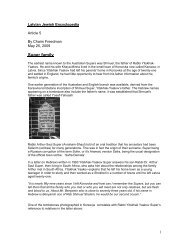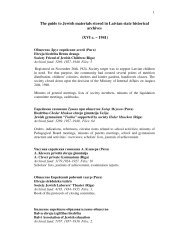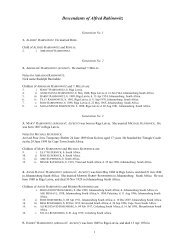Small Riga Ghetto
Small Riga Ghetto
Small Riga Ghetto
You also want an ePaper? Increase the reach of your titles
YUMPU automatically turns print PDFs into web optimized ePapers that Google loves.
141<br />
ficult to make a fire. And if one thing was achieved, then the next one was<br />
certainly lacking. A bit of salt, pepper, or onions – where to get them?<br />
In our home it was my son who did the housework. How and where he had<br />
learned this art remained a constant mystery to me. He had lost his mother in<br />
the ghetto at the tender age of sixteen, and in the good old days at home he had<br />
certainly never paid any attention to these things. Apparently he had inherited<br />
this talent, for his mother had been a splendid housekeeper and was known in<br />
<strong>Riga</strong> for her excellent cooking.<br />
I was the one who went shopping. First I would get the rations we were officially<br />
entitled to, which were very meager. Often the bread had not been<br />
baked properly; moreover, we received many "good things". For example, the<br />
fish was never fresh and always stank.<br />
There was always a lot of activity in the German ghetto, where the main<br />
food distribution warehouse was located, on Ludzas Street next to the Command<br />
Headquarters. (Four times as many people lived there as in our ghetto.)<br />
Unlike us, they received their food from the Economic Authority of the Gestapo.<br />
In their ghetto one could nearly always see barrels full of large stinking<br />
fishheads. The stink was noticeable as soon as one entered the ghetto. Vegetables<br />
too were often delivered there in a barely edible condition. But in spite of<br />
all this, the German Jewish women were still able to produce something edible<br />
from these raw materials. In the German Jewish ghetto and in ours, there was<br />
meat only once a week, and it was only horsemeat. So we only shuddered<br />
"Brrr" when we picked up this meat. Of course all this was only a supplement<br />
to what we scrounged at our work stations or bought from those who had<br />
smuggled food into the ghettos at great risk.<br />
There were various places to shop. The most important one was the Lithuanian<br />
market (see the chapter on the <strong>Small</strong> <strong>Ghetto</strong>). Though I speak here of a<br />
market, the reader should not imagine one in the normal sense of the word.<br />
The people stood around in this market, and they had in their pockets or hands<br />
a cigarette or a pack of cigarettes, onions, some salt, and so on. A person had<br />
to be very careful when buying or selling, for woe betide him if the guards<br />
came upon him and found anything. If that happened, one's life was on the<br />
line. The "Litvaks" (Lithuanian Jews) also traded in secret at their homes, and<br />
in view of the circumstances some of them did so on a large scale. The bestknown<br />
traders were the Lithuanian Jews Gedalie and Sane. Who among us<br />
does not know these two names? We believed Gedalie to be a bit foolish, but<br />
in business matters he made fools of us. He preached his own philosophy and










